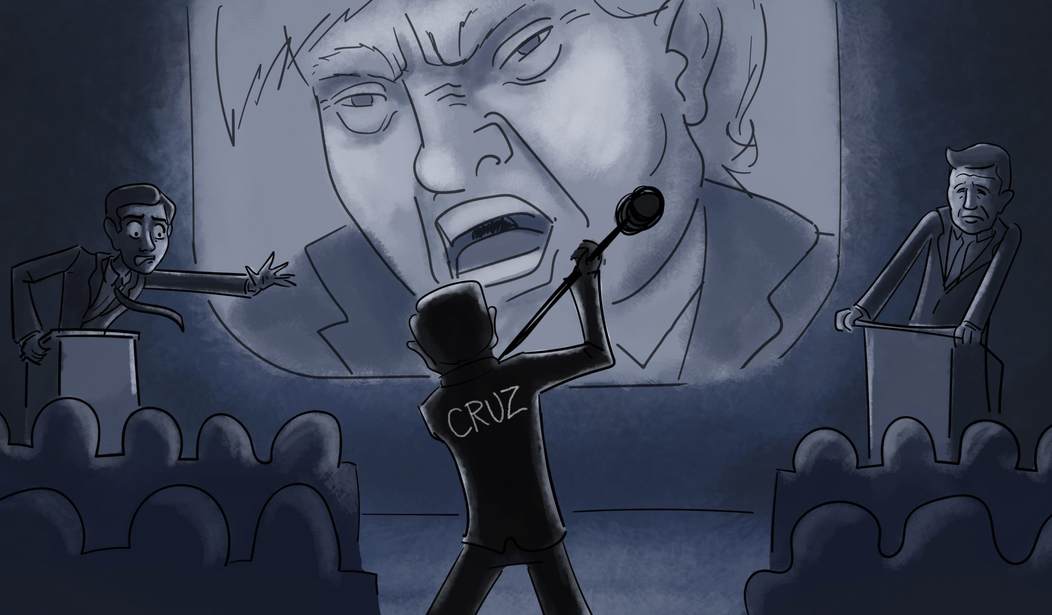Michigan was supposed to give John Kasich a victory. Instead, he finished a narrow third place behind Ted Cruz and Donald Trump. This proves the “everybody stay in till the contested convention” strategy is doomed to fail for the same reason we have antitrust law: cartels hurt consumers and ultimately fail.
The party establishment (whatever that means anymore) is divided between two strategies for stopping Trump: 1) join Ted Cruz (the way Carly Fiorina did at an event in Miami on Wednesday) as the best choice to beat Trump, or 2) engage in textbook “cartel” behavior that any economics student or antitrust lawyer knows is likely to fail.
Basic economics lesson: A cartel is a group of market participants getting together and agreeing not to compete with each other in order to raise prices and extract higher profits. One classic way this occurs is through “market division” (banned by the Sherman Act), where sellers divide up the map of customers and agree not to sell in each other’s territory. That way, they can charge as much as they like and consumers are stuck with the higher prices because they don’t have a less expensive choice. Consumers lose, cartel members win.
The taxi industry is a great illustration: Taxi companies did not face competition in their cities until Uber entered the market and started driving prices down.
But here’s the problem: cartels are vulnerable to attack from three directions. First, cartel members are always tempted to break their agreements with each other and try to undercut other cartel members by entering each other’s territory (this is why drug cartels are often literally at war). Second, cartels are vulnerable to innovative new competitors who enter the market and sell a better or cheaper product, winning away customers. Third, people hate cartels. This is why, in most of Western civilization, they are ostensibly banned and why cartel behavior in any market can be criminally punished. While free market advocates might argue the first two vulnerabilities render laws against cartels unnecessary, everyone agrees cartels are usually destructive to consumers.
This brings us to the GOP primary. Right now, party leaders are saying Rubio, Kasich, and Cruz all need to stay in the race to siphon off votes from Trump by region and deny him a majority to get to a contested convention, where party leaders can sort out the mess. They are literally advocating for the “not Trump” candidates to form a cartel and engage in geographic market division: “Rubio, compete in Florida! Kasich, complete in Ohio! Cruz, compete in North Carolina and Missouri! Divide the market and extract more delegates!” It seems tempting, just like most cartels do at first, but it’s triply flawed:
- The candidates are tempted to cheat by human nature and rational self-interest. Rubio campaigned in Texas, Georgia, Oklahoma and Tennessee on Super Tuesday, and in Idaho this Tuesday — where he received no delegates — but kept Cruz from extracting 50% wins that would have shut out Trump. Likewise, Cruz is campaigning hard in Ohio and Florida, where he can probably deny Kasich and Rubio their winner-take-all homestates.
- Trump is an innovative market entrant and a classic monopolist. He has been able to smell a weak cartel all his life and undercut it, and he smells one now: Trump the monopolist can do an end-run around Rubio in Florida and Kasich in Ohio because he’s not part of the cartel.
- The voters hate cartels. The “gentlemen’s agreement” not to compete with each other in order to block Trump is being rhetorically sold as self-sacrificial party-saving behavior, but the voters know it’s just an attempt to get them to give up their vote so that the candidate they vote for isn’t the candidate likely to win. And given the rules, the optics are terrible, awful, no-good. They feed the very reasons Trump has arisen in the first place. Even if the cartel plan succeeds in denying Trump the nomination, the GOP will lose in November.
Ted Cruz, a former director of the Federal Trade Commission who no doubt understands antitrust law and market economics, understands this. The only way to beat a monopolist like Trump is not through cartelization: it’s through innovative market competition.
Trump is like IBM in the early 1980s or Microsoft in the early 2000s — the big, heavy-hitting incumbent and dominant favorite. Cruz wants a chance to be Apple, to displace the market leader by out-competing him. Monopolies are also vulnerable to market competition if they face a bold entrant. Economics tells us in a two-man race, Cruz will have the insurgent viability of Uber.
This brings us to Michigan, which on Tuesday was a great case study. Everyone said, “Vote for Kasich even if you prefer Cruz or Rubio to stop Trump.” Kasich had the supposed momentum. Kasich is the moderate, popular governor of a bordering state. He had a good debate. He spent the most time there. He was the “logical choice.”
But the voters gave Trump a victory, Cruz second place, Kasich third, and Rubio fourth, meaning Kasich’s “surge” to third came largely at Rubio’s expense. The voters did not coalesce around the cartel member who was supposed to dominate his region, the Midwest. They went with the two candidates who refused the party-sponsored cartel.
Cruz is right to attack this literal manifestation of the Washington Cartel, and voters are right that their choice is a Trump nomination or a Cruz nomination.









Join the conversation as a VIP Member